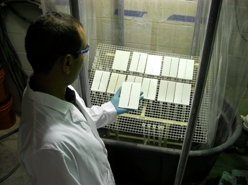KPMG LLP, the U.S. audit, tax and advisory firm, recently announced it achieved a 22 percent carbon reduction over three years from its 2007 baseline target, as part of its plan to improve the environmental performance of its business.
About 55 million years ago, the Earth burped up a massive release of carbon dioxide into the atmosphere – an amount equivalent to burning all the petroleum and other fossil fuels that exist today.
The summer travel season is here and whether you are traveling by train, plane or automobile, your vacation is likely to increase your carbon footprint. Gary Gero, president of the Climate Action Reserve, a Los Angeles-based nonprofit that registers and issues carbon offsets, offers five easy and affordable ways to reduce the impact of your summer travel on the planet.
Mr. Peanut is arriving in Washington, D.C. – by way of his new biodiesel Nutmobile – to open a new urban park, Planters Grove, in Northeast D.C.
As one of the planet’s largest single carbon absorbers, the ocean takes up roughly one-third of all human carbon emissions, reducing atmospheric carbon dioxide and its associated global changes.But whether the ocean can continue mopping up human-produced carbon at the same rate is still up in the air.
Since 1998, climate scientists have attempted to reconstruct global annual temperature over the last millennium using natural proxies such as tree rings and ice cores. However, a new study finds substantial uncertainty in these reconstructions.
Which U.S. metro region is most likely to come out of the next recession, natural disaster or other regional “shock” relatively unscathed? Rochester, Minn. A little more battered might be College Station-Bryan, Texas.
An estimated two billion people in the developing world heat and cook with a biomass fuel such as wood, but the practice exposes people – especially women – to large doses of small-particle air pollution, which can cause premature death and lung disease.
Solar-generated electricity is taking a new form – that of solar panels shaped like artistically fashioned ivy leaves decorating a wall’s surface. The first location in the United States to apply this colorful array is the University of Utah in Salt Lake City. This new product called Solar Ivy was developed by Sustainably Minded Interactive Technology (SMIT), a company in New York.

Mitsubishi Electric & Electronics USA, Inc. (Mitsubishi Electric) and Mitsubishi Motors North America, Inc. (MMNA) recently debuted a solar-powered charging station for electric vehicles at the MMNA headquarters in Cypress, Calif.
Companies in Massachusetts and Vermont company that store significant amounts of oil are facing EPA penalties of up to $177,500 for failing to take adequate precautions to prevent and contain spillage of that oil.
The National Science Foundation has awarded a five-year, $10 million grant to Florida State University and the University of Florida to coordinate 92 institutions in 45 states working to digitize the nation’s biological collections.

Chemically bonded phosphate ceramics create a passivation layer that stops corrosion and is protected by a tough ceramic outer layer. These compounds protect metal from corrosion better than other options, such as polymer paints, and are less expensive than using stainless steel.
Freedman Farms Inc. and its president, William B. Freedman, pleaded guilty yesterday in federal court in New Bern, N.C., to violating the Clean Water Act when they discharged hog waste into a stream that leads to the Waccamaw River, the Department of Justice’s Environment and Natural Resources Division and the U.S. Attorney’s Office for the Eastern District of North Carolina announced.
The NIH’s National Institute of Environmental Health Sciences has awarded Tulane University School of Public Health and Tropical Medicine $6.5 million for a five-year study exploring the potential health impacts of the Deepwater Horizon disaster on pregnant women and women of reproductive age living in Louisiana’s coastal parishes.
When Americans were asked if they think that there have been more devastating natural disasters, including hurricanes, tornadoes and earthquakes recently, three quarters of U.S. adults say they believe there have been more 76 percent, with three in 10 saying they believe there have been many more 31 percent.
Originally proposed as a small gathering of EVTV viewers, the concept grew into more of a convention within two weeks of the announcement due to the number of early registrants.
On July 5, 2011, the State of Georgia received authorization to administer and enforce EPA’s Lead Renovation, Repair, and Painting (RRP) Program.
Researchers have discovered a way to capture and harness energy transmitted by such sources as radio and television transmitters, cell phone networks and satellite communications systems.
The Cross-State Air Pollution Rule will protect communities that are home to 240 million Americans from smog and soot pollution, preventing up to 34,000 premature deaths, 15,000 nonfatal heart attacks, 19,000 cases of acute bronchitis, 400,000 cases of aggravated asthma, and 1.8 million sick days a year beginning in 2014 – achieving up to $280 billion in annual health benefits.